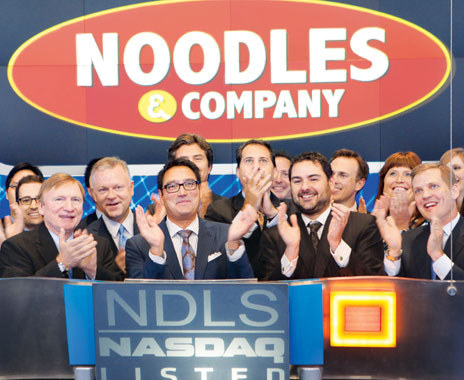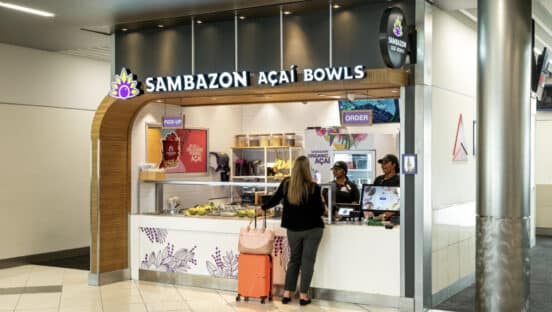In the last few years, Wall Street has shown an increased appetite for restaurant companies as a whole, and it’s fast-casual brands in particular that increasingly grab investors’ attention.
That was perhaps no more evident than in 2013, when enthusiasm for fast-casual restaurant concepts reached new heights with gangbuster initial public offerings (IPO) from Potbelly and Noodles & Company. The IPOs raised about $100 million each, and stock prices of both companies more than doubled on their opening days of trading.
Analysts say their success shows that the market is welcoming to limited-service brands and that even smaller chains can make a go on Wall Street—especially those with plenty of potential for future growth. Experts also say the success of brands like Chipotle, Noodles & Company, and Potbelly lays out a model for future fast-casual IPOs. Brands with a focus on healthier or at least higher-quality ingredients are even more likely to succeed, they say.
“The stock market in general has been very strong. Restaurant companies have been along for the ride in terms of performance,” says Bob Bielinski, managing director of the restaurant industry practice at CIT Corporate Finance, which provides financing, leasing capital, and advising services.
Aside from high-profile wins from Potbelly and Noodles & Company, market observers say, the overall performance of restaurant companies on the market is trending up over the last two years, with even better prospects for 2014. “The market has indicated an acceptance of restaurant companies,” Bielinski says. “And I think it’s particularly interested in growth companies.”
In its first quarter as a publicly traded company, Chicago-based Potbelly in November reported third-quarter revenues of $78 million, up 11.7 percent from the previous quarter’s $69.9 million. The sandwich chain used the $108.8 million from its IPO to pay a dividend to investors, pay down debt, and use as working capital.
“We view the IPO as a significant milestone, but not a destination,” CEO Aylwin Lewis said in the company’s third-quarter financial statement.
In an October 15 video interview with NASDAQ’s “Signature CEO” series, Lewis said the IPO would help the brand build a “bulletproof balance sheet” and push more growth. The company opened about 40 stores in 2013 and expects aggressive growth to continue.
“We’re promising double-digit growth for the foreseeable future,” he said in the video. “We are 300 units. And there is so much white space in the U.S. for us to grow. So we’re going to bring Potbelly to as many neighborhoods in the U.S. as possible. Because I believe every neighborhood deserves a Potbelly.”
Some of the strength of restaurant companies on the market may just fall in line with an improving economy and overall better stock performance.
“Consumers are expecting a recovering economy, and investors are expecting a recovery. And restaurants are among the first companies that will benefit in a recovering economy,” says Jonathan Maze, editor of Restaurant Finance Monitor. “If you were unemployed last month and this month you get a job, one of the first things you’re going to do is what? Go out and eat. Restaurants get a very quick benefit in a recovering economy. But they’re also the first to get pounded in a recession.”
While it may be easy to assume that only the biggest name brands go public, Maze says, the 2013 success of Potbelly and Noodles & Company should be encouraging to other smaller brands.
“It does show that smaller IPOs can work,” he says. “ If you have some growth and financial performance, investors are going to invest in your concept. So frankly, there’s no question that you’re going to see more IPOs in 2014.”
Experts expect the most successful IPOs will come from emerging concepts, not more mature companies. One brand that might get a return similar to Noodles & Company, which saw shares more than double after just a few days on the stock market, is Jimmy John’s, if it decided to go public, Maze says. He adds that privately held Chick-fil-A and In-N-Out Burger would likely be incredibly successful if they ever went public, though that seems farfetched for the family-owned companies.
[pagebreak]
Other limited-service brands are gauging whether or not going public makes sense for them in the near term. Companies reportedly considering IPOs include Papa Murphy’s, Checkers/Rally’s, and FOCUS Brands, which counts Cinnabon, Auntie Anne’s, and Carvel in its portfolio.
But any quick-service chain that comes to Wall Street will likely come under more scrutiny as the entire segment grapples with a slew of changing consumer behavior, analysts say. While the restaurant industry was once split between fast food and casual dining, fast casual is wedging its way between the two, recruiting customers from both ends of the spectrum.
“These big fast-food chains definitely have their work more cut out for them,” says Jason Moser, an analyst who covers restaurants and other industries for financial-services company The Motley Fool. “They’re facing headwinds. That is a relatively mature market. Those are relatively mature offerings. McDonald’s has been around forever, so there’s nothing really different there.” He adds that quick serves are facing higher food and labor costs, and a consumer perception that the food isn’t good for you. “Panera, Noodles, and Potbelly all pay a little more attention to the quality of food they’re offering. I think that’s really putting fast-food restaurants in a bind.”
Moser says the success of IPOs from Potbelly and Noodles & Company was surprising. Those are still relatively small companies, he says, and they haven’t yet proved how they’ll cope with rising food costs or whether they can pass on some of those costs to customers. The more value-minded quick-service concepts have had trouble raising prices, while companies like Chipotle have added incremental price increases without hurting business. And even with broad enthusiasm, Moser says, neither Potbelly nor Noodles & Company has clout like segment standout Chipotle.
“There are a lot of things those companies in particular still have to prove,” he says.
Though its success may be unique, Chipotle will continue to be a yardstick for other restaurants’ performance. It has one of the highest valuations among its peers on the market, and most startup brands are imitating Chipotle’s operation model.
With more Americans, especially those in younger age ranges, focusing on healthy options and high-quality ingredients, chains like Chipotle will likely have a leg up on the market, says Jim Yin, an equity research analyst at New York S&P Capital IQ, a data and analytics firm for financial professionals.
“Your traditional fast food has been more stagnant, and those that have focused more on healthier eating have done better, in particular Chipotle and Starbucks,” Yin says. “I think investors like Chipotle because of growth. I’m not sure they like it because it’s serving healthier food. It’s getting the growth. And it’s getting growth because people like it.”
Restaurants aren’t facing the same challenges as other economy segments, says R.J. Hottovy, a restaurant industry analyst at Morningstar Inc., a Chicago-based investment research firm. Brick-and-mortar retailers are reeling as customers increasingly move to online shopping, but in the restaurant world, no such digital threat has surfaced. And while the market is favorable to the entire restaurant industry, Hottovy says, investors are increasingly realizing that the economics behind the growing fast-casual segment work, making fast casual’s performance a bright spot for the industry.
“I would expect to see more fast-casual names come to the market [in 2014],” he says. “If you’re a chain proven in successful markets—in the 200–300-unit range—it might be worth it to consider.”
In an October conference call with analysts, Noodles & Company CEO Kevin Reddy highlighted his company’s successful limited-time offers, including the World Tour, an LTO launched in the fall that includes flavors from the Mediterranean, Asia, and Latin America. Reddy, a former Chipotle executive, says the brand is well positioned with a unique concept. Dishes are made to order, served on real china, and usually delivered to the table within five minutes. “We feel our food and service platforms together set us apart from many of our competitors,” he said on the conference call. “But there’s also aspects of the brand we haven’t fully capitalized on.”
Specifically, he says, the company will continue increasing the level of service by adding more dining room attendants, which were in about 15 percent of stores in October. Those hosts check on customers, educate them on the menu, and bring extra beverages.
While both Potbelly and Noodles & Company chose public financing to help spark future growth, it’s not an option that works for all brands. While there are obvious advantages, like an infusion of capital, an IPO brings more public scrutiny and less direct control. On top of that, the public market can be more shortsighted than private investment. That could make investment from private equity firms a better option for companies looking to make a turnaround, experts say.
“The public market does not reward you for long-term thinking sometimes,” says Dennis Monroe, chairman of Monroe Moxness Berg PA, a law firm specializing in multiunit franchise finance, mergers and acquisitions, and taxation. “The public market does not necessarily reward you for spending a lot of money on development and R&D, which private companies may do.”
Whether restaurants are looking for capital from private equity, private financing, or the public market, Monroe says, there’s never been a better time to grow. And as private equity groups continue to invest in restaurants, there could be even more companies hitting the stock market as those equity groups look to cash in on their investments.
“There’s more money than deals now in the restaurant space,” Monroe says. “That’s what you’re seeing. But having private equity in the restaurant space, which seems to be at a high point now, I think really helps the IPO market. Because that’s one exit strategy for the private equity investor. It’s a good exit strategy.”







